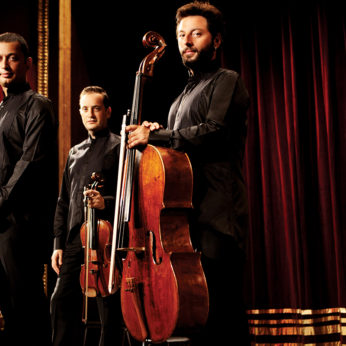Composer: Edvard Grieg (b. 1843 - d. 1907)
Performance date: 02/07/2016
Venue: Bantry Library
Composition Year: 1877-8
Duration: 00:37:45
Recording Engineer: Richard McCullough, RTÉ lyric fm
Instrumentation Category:String Quartet
Artists:
Borusan Quartet (Esen Kıvrak, Olgu Kızılay [violins], Efdal Altun [viola], Cağ Ercağ, [cello]) -
[quartet]

I have recently finished a string quartet
that I still haven’t heard. It is in G minor and is not intended to bring
trivialities to market. It strives towards breadth, soaring flight and above
all resonance for the instruments for which it is written. I needed to do this
as a study. Now I shall tackle another piece of chamber music; I think in that
way I shall find myself again. You can have no idea what trouble I had with the
forms, but this because I was stagnating, and this in turn was in part on
account of a number of occasional works (Peer Gynt, Sigurd Jorsalfar and other
horrors) and in part on account of too much popularity. I have thought of
saying ‘Farewell shadows’ to all of this – if it can be done.
Despite his
classically based studies in
early become an enthusiastic adherent to the cause of Norwegian romantic
nationalism. He also developed a life-long interest in Norwegian folk tunes and
an ever-growing love of his country’s wild, mountainous scenery. The Quartet
was written during a prolonged stay in the Hardanger district where both the
mountains themselves and their music became key influences in his composition.
There are few
quartets with the sheer sonic power of Grieg’s Quartet, a power that makes
itself felt immediately as the work’s defining motto theme is announced in
unison in the slow introduction. This distinctive idea is taken from a song – The Fiddlers – that he wrote two years
earlier and it re-appears in various forms throughout the piece. The driving
first subject proper has enormous latent power, while the second subject is a
lyrical version of the motto theme, so the two subjects are highly polarised in
both mood and texture. This makes for a dramatic development as the first
subject’s headlong momentum is continually being held back by the motto theme
and the massive repeated chords, which are another feature of this movement.
After a regular recapitulation, the movement ends with a highly atmospheric
coda as the cello plays the motto theme over a ghostly sul ponticello from the other instruments.
The Romanze leaves the passion of the first
movement behind, opening with the cello leading the quartet with its
serenade-like theme. This relaxed idea is contrasted with another restless and
agitated subject and the movement consists of these two moods being contrasted
with each other, sometimes alternating, sometimes together. The Intermezzo with its intriguing play of
triple- and duple-time signatures brings us closer to the idea of Norwegian
folk-music. The central trio does indeed call up a Norwegian folk tune, which
is passed from instrument to instrument, this vigorous tune from the mountainy
men being set against another lyrical and reflective idea.
The finale reflects
the first movement with a slow introduction based on a fragment of the motto
theme, though its uncertain accents are banished by the Mediterranean gaiety of
a light-hearted saltarello. But the mountains of the North gradually re-appear
with all their Nordic passionate melancholy, dampening the southern joie de
vivre. Towards the end the main theme from the first movement violently asserts
itself before the final proclamation of the motto brings the work to a
thunderous conclusion.
Copyright © 2025 West Cork Music. All rights reserved.
Designed and developed by Matrix Internet